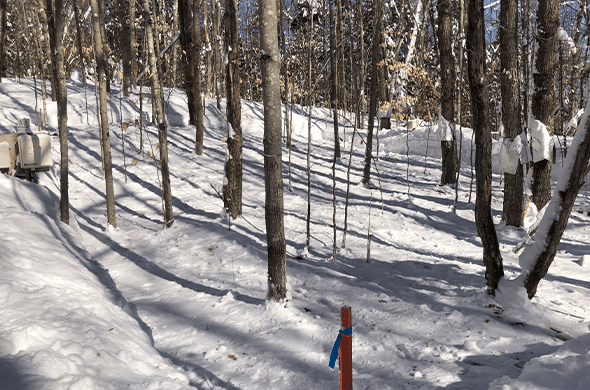Climate Change Across Seasons Experiment (CCASE)
 Mean annual temperatures for the Northeastern U.S. are projected to increase up to 5 ° C by the year 2100, which could increase nutrient uptake and carbon storage by trees. However, the increase in temperature will lead to a smaller winter snowpack and increased frequency of soil freeze/thaw cycles, which may offset the positive effects of warming by damaging trees. We established the Climate Change Across Seasons Experiment (CCASE) at Hubbard Brook Experimental Forest, NH in 2012. The goals of this research are to determine the interactive effects of winter and growing season climate on nutrient uptake and carbon sequestration in northern hardwood forests.
Mean annual temperatures for the Northeastern U.S. are projected to increase up to 5 ° C by the year 2100, which could increase nutrient uptake and carbon storage by trees. However, the increase in temperature will lead to a smaller winter snowpack and increased frequency of soil freeze/thaw cycles, which may offset the positive effects of warming by damaging trees. We established the Climate Change Across Seasons Experiment (CCASE) at Hubbard Brook Experimental Forest, NH in 2012. The goals of this research are to determine the interactive effects of winter and growing season climate on nutrient uptake and carbon sequestration in northern hardwood forests.
We hypothesize that warmer soil temperatures will increase forest productivity, as well as rates of water, carbon, and nutrient uptake by trees and saplings. However, we expect that a reduced winter snowpack and increased soil freezing will offset these changes by damaging roots. Results from this study will help us understand the effects of climate change on rates of carbon sequestration and nutrient retention of these forests, as well as potential effects on water air and water quality.
Funding for the establishment of this experiment came from the Long Term Ecological Research Network and a National Science Foundation CAREER grant (DEB 1149929).
Investigators:
- Pamela Templer, Boston University
Students and Staff:
- Stephen Caron
- Cameron Chin
- Emerson Conrad-Rooney
- Emma Daily
- Jamie Harrison
- Rebecca Sanders-Demott
- Patrick Sorenson
Collaborators:
- Heidi Asbjornsen, University of New Hampshire
- Jennifer Bhatnagar, Boston University
- Peter Groffman, Cary Institute of Ecosystem Studies
- Caitlin Hicks Pries, Dartmouth College
- Andrew Reinmann, City University of New York
- Nicholas Rodenhouse, Wellesley College
- Lindsey Rustad, USDA Forest Service, Northern Research Station
Project Websites:
Harrison, J. L., Reinmann, A. B., Maloney, A. S., Phillips, N., Juice, S. M., Webster, A. J., & Templer, P. H. (2020). Transpiration of Dominant Tree Species Varies in Response to Projected Changes in Climate: Implications for Composition and Water Balance of Temperate Forest Ecosystems. Ecosystems. https://doi.org/10.1007/s10021-020-00490-y
Harrison, J. L., Sanders‐DeMott, R., Reinmann, A. B., Sorensen, P. O., Phillips, N. G., & Templer, P. H. (2020). Growing-season warming and winter soil freeze/thaw cycles increase transpiration in a northern hardwood forest. Ecology, 101(11), e03173. https://doi.org/10.1002/ecy.3173
Reinmann, A. B., Susser, J. R., Demaria, E. M. C., & Templer, P. H. (2019). Declines in northern forest tree growth following snowpack decline and soil freezing. Global Change Biology, 25(2), 420–430. https://doi.org/10.1111/gcb.14420
Sanders‐DeMott, R., McNellis, R., Jabouri, M., & Templer, P. H. (2018). Snow depth, soil temperature and plant–herbivore interactions mediate plant response to climate change. Journal of Ecology, 106(4), 1508–1519. https://doi.org/10.1111/1365-2745.12912
Sorensen, P. O., Finzi, A. C., Giasson, M.-A., Reinmann, A. B., Sanders-DeMott, R., & Templer, P. H. (2018). Winter soil freeze-thaw cycles lead to reductions in soil microbial biomass and activity not compensated for by soil warming. Soil Biology and Biochemistry, 116(Supplement C), 39–47. https://doi.org/10.1016/j.soilbio.2017.09.026
Templer, P. H., Reinmann, A. B., Sanders-DeMott, R., Sorensen, P. O., Juice, S. M., Bowles, F., Sofen, L. E., Harrison, J. L., Halm, I., Rustad, L., Martin, M. E., & Grant, N. (2017). Climate Change Across Seasons Experiment (CCASE): A new method for simulating future climate in seasonally snow-covered ecosystems. PLOS ONE, 12(2), e0171928. https://doi.org/10.1371/journal.pone.0171928
Current Projects
We combine long-term monitoring with visionary experiments to advance our understanding of forest ecology.
